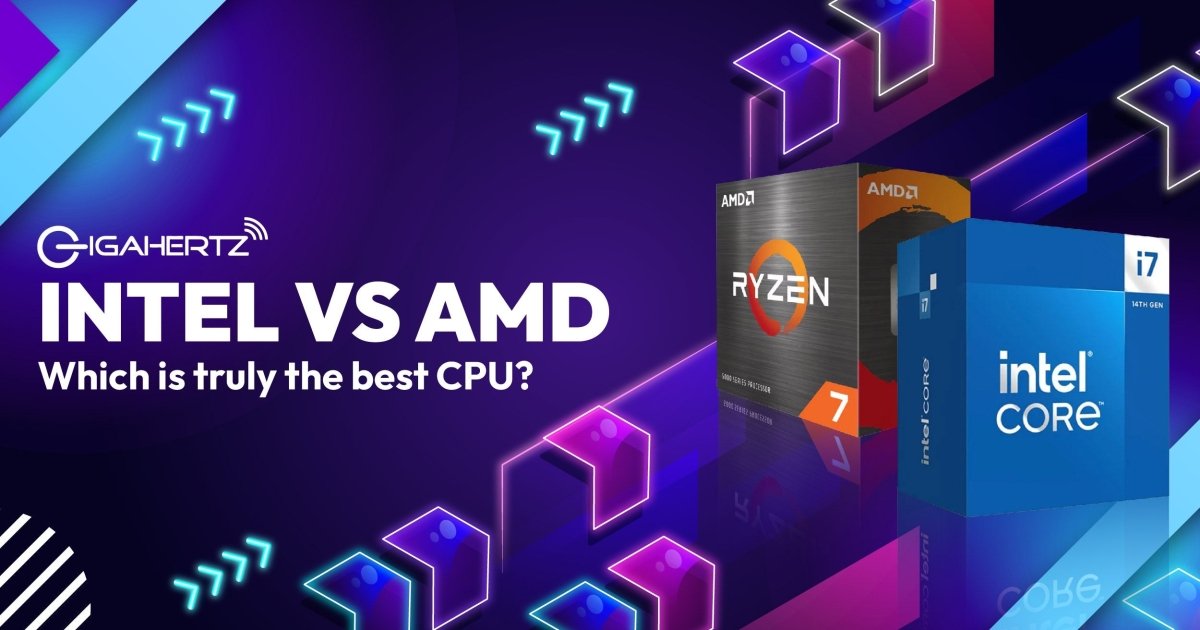It has long been debated by computer enthusiasts and other tech nerds which is the better CPU for a computer. And it’s still being debated to this day, some even made teams to show their favoritism. Team Blue is for Intel, and Team Red is for AMD. Which makes you wonder why there hasn’t been a clear winner in this age of technological advancement.
We’re here to finally uncover the truth between the two processors and decide on which one is actually better for your computer. We’ll analyze the latest specs and features, pricing and value, and the overall performance of the processor to get an indicative evaluation of the two brands. For our avid gamers out there, we’ll check what CPU is better in giving you an advantage in the latest games.
Specs and Feature Round

Outlining what each CPU can offer, Intel and AMD have their particular way of showing power and performance. Intel’s Core i9-13900K directs attention with 24 cores and 32 threads, and a high boost clock of 5.8 GHz. It maintains a thermal design power (TDP) of 125W but can push to 253W for peak performance
On the contrary, AMD's Ryzen 9 7950X3D claims a 144MB cache and an efficient energy profile, topping at 162W under full load. It can also almost match Intel’s capabilities, with a boosted clock speed of 5.7 GHz, without draining that much power.
Intel’s strength lies in its architectural design, which offers an overall balance in its performance. The Core i9-139000K has the capacity to handle multithreaded tasks without slowing down, making it ideal for both productivity work and gaming. The catch is that this chip is power hungry, and you might have to pay higher electricity bills, and you’ll need a better cooling system for your computer.
AMD Ryzen 9 7950X3D excels in gaming. Thanks to its large cache, it allows for high-frame-rate moments. However, being good at gaming means it can lack general performance for productivity compared to what Intel can offer. Additionally, Ryzen relies on the newer DDR5 memory means users will deal with higher upgrade costs if they have older systems. What AMD has that Intel doesn’t is the 3D V-cache. The vertical cache allows the processor to be one of the fastest in the world.
After careful consideration, Intel came up on top in the specs and features department due to its versatility in performance. The CPU generally provides a wider range of use for a better user experience compared to AMD, which is hard to overlook.
Pricing and Value Round

For a long time, AMD has been the go-to CPU on the market for a cheaper purchase thanks to its perks, like included coolers and the choice to overclock among its line of products. The brand’s features, like the ‘Precision Boost Overdrive’, added its place to the value leaders. Unfortunately, AMD’s price hikes and the removal of bundled coolers, coupled with increased cooling demands for its CPUs, have dampened the competitive edge of the brand. This shift has made AMD’s offerings less appealing to those seeking maximum value for their investment.
Gamer Round

When it comes to the realm of gaming, AMD is so far the better choice of a CPU than Intel. Nonetheless, Intel still has the image of being a much higher-end CPU than AMD. Intel isn’t very much preferred by gamers as it is an all-arounder type of CPU than AMD, which heavily focuses on the area of gaming.
AMD really steals the spotlight from Intel as its X3D line of CPU chipsets includes the Ryzen 7 7800X3D, Ryzen 9 7950X3D, and Ryzen 9 7900X3D, which are remembered for CPUs that are built for gamers who demand crazy strong performance.
Power consumption

If we’re talking about the CPUs’ power consumption, we should also talk about their cooling power. And when it comes to cooling and power, AMD, with its 5nm process technology, surpasses Intel’s Raptor Lake series despite Intel’s improvement on the series.
AMD’s chips are far more reliable when it comes to power efficiency, leading to more power saving, and a cooler chip means that it puts less burden on the cooling system. Despite Intel’s effort to match AMD with this, the Raptor Lake Series still tends to use more power. On the other hand, some might argue that the performance that the Intel CPUs bring justifies the power they consume.
AMD still takes this round as the overall efficiency of its processors offers more power with a more manageable cooling system. Making it more favorable to those who like energy consumption and a cooler computer when managing tasks.
Verdict

With all of the information disclosed, we realized why this debate took as much time as it had. So what is our say on this debate?
Intel has an edge with speed and loading multiple tasks, but AMD isn’t very far from this aspect of speed and heavy multitasking, and sometimes even performs efficiently when it comes to energy consumption. With a very close competition between the two, it comes down to what you really need as the user.
When your focus is gaming, you can absolutely just choose an AMD CPU. Nonetheless, if you’re looking for multi-processing, then Intel’s CPUs are the way to go–especially the i7 and i9 models, which will definitely be perfect for someone like you.

